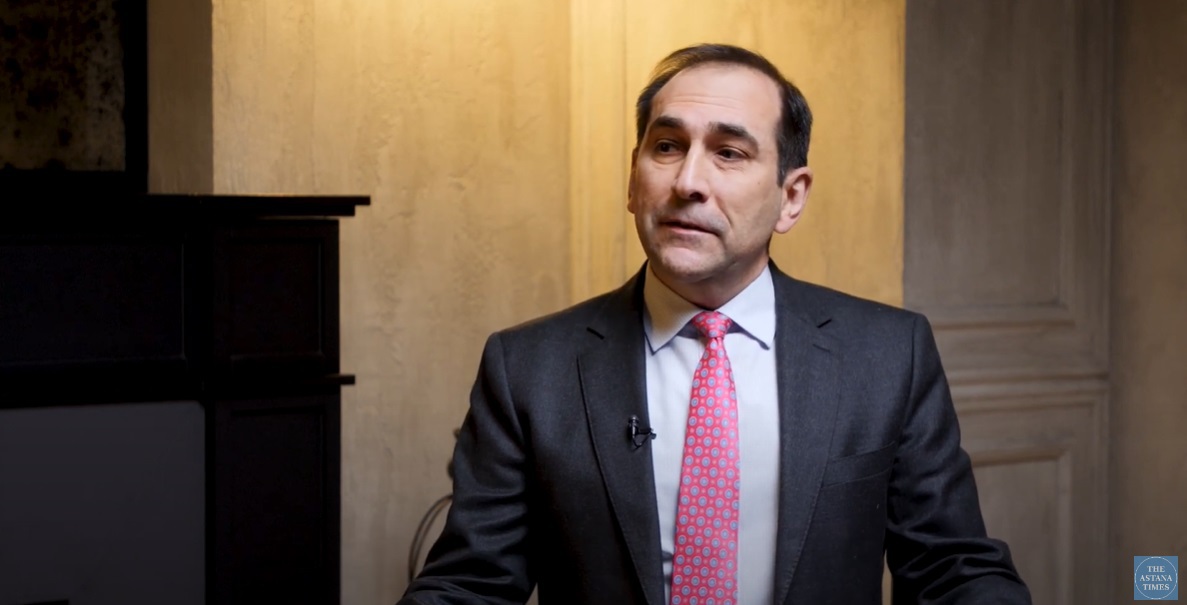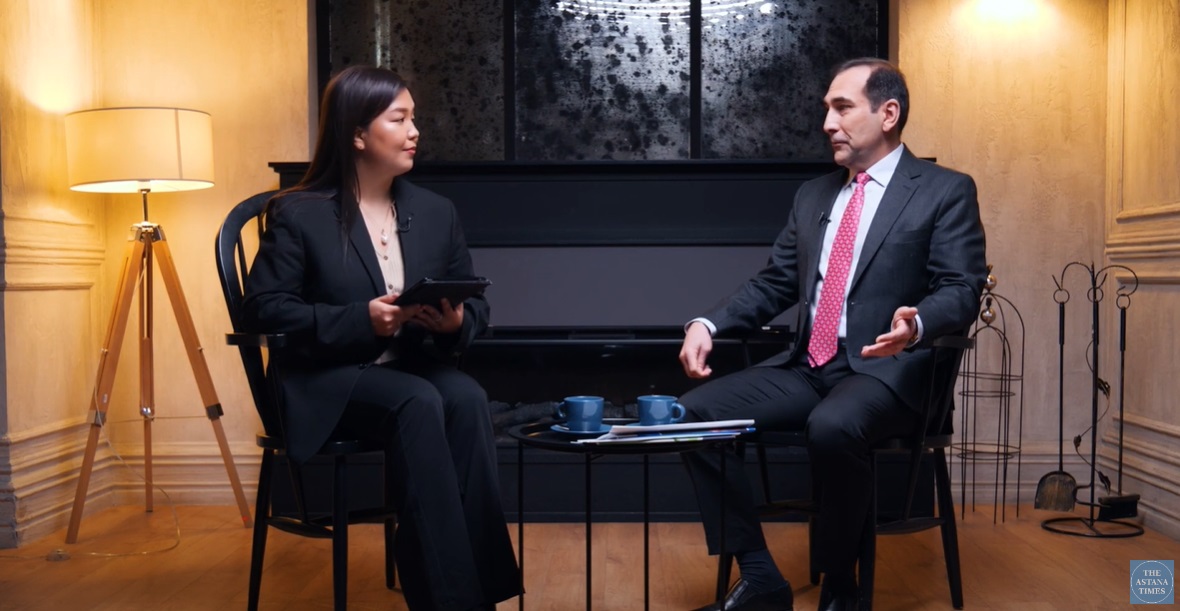ASTANA – The World Bank supported Kazakhstan across diverse policy areas in more than 30 years of cooperation, contributing more than $8 billion. World Bank Country Manager for Kazakhstan and Turkmenistan Andrei Mikhnev spoke to The Astana Times, unveiling key details of this long-standing partnership.

Andrei Mikhnev. Photo credit: a screeshot from The Astana Times YouTube interview.jpg
A ‘very active’ year
Mikhnev, originally from Ukraine, has served in this role in Kazakhstan since February 2023. For him, a journey in Astana, one of the coldest capitals in the world, interestingly, was a shift from another cold capital, Ulaanbaatar in Mongolia.
“I think it was a very active year for us, the World Bank in Kazakhstan, with our partners here (…) we sharpened much more what the priorities could be. And also with our counterparts, both in the government, the private sector and civil society, I think there is a much better dialogue happening and understanding of how the World Bank can support Kazakhstan to thrive for growing, for becoming a high-income country in the future,” he said.

Assel Satubaldina and Andrei Mikhnev during the interview. Photo credit: a screenshot from The Astana Times YouTube interview.jpg
The World Bank provided more than $8 billion to support Kazakhstan’s economic growth through over 50 projects. Seven active projects are currently underway, he added, emphasizing that they span sectors such as human development, education, underpinning Kazakhstan’s broader economic diversification beyond oil.
One of the latest is a $92 million project on digital connectivity to ensure rural areas in the country have access to broadband internet.
“We have quite an ambitious pipeline of project financing,” said Mikhnev, who has more than 20 years of international experience focusing on economic development. “In general, we are very satisfied with our partnership with Kazakhstan. But we believe we can definitely do more.”
No debate on where Kazakhstan should go
According to Mikhnev, Kazakhstan stands at a critical juncture. “I think we have the right momentum here. Now, when the government is really declaring their intention to deepen the reform,” he noted.
This is also the moment when international financial institutions such as the World Bank can support the reform agenda.
“It [reforms] cannot be done separately and say, ‘We have a big reform agenda, but we need to do it ourselves.’ In fact, it is always good when you rely on something that has already been done in other countries,” said Mikhnev.
“We have a very positive signal, which is being heard from the authorities of Kazakhstan. I think in many addresses from the President and the members of the government, we really see that the government is serious about reform,” said Mikhnev.
According to him, the declarations and intentions made by Kazakhstan’s leadership leave little room for debate on the country’s direction. But while the consensus on the path forward is clear, the key challenge is to implement it all.
Mikhnev also emphasized the importance of considering external factors in the country’s reform strategies, pointing out the vulnerability of Kazakhstan’s economy to global market fluctuations, particularly given its reliance on oil exports.
Addressing another challenge, Mikhnev noted the Kazakh government’s ambitious goal to double GDP by 2029, necessitating at least 6% annual growth. President Kassym-Jomart Tokayev set this objective in his state-of-the-nation address in September 2023.
“Much more focus needs to be done on how to ensure that dependence on oil-driven growth is not undermining the overall growth,” Mikhnev added, saying it is of paramount importance to ensure the complexity of products produced in Kazakhstan is increasing.
The war in Ukraine and the COVID-19 pandemic were also mentioned as significant disruptors to global economic stability, offering Kazakhstan both challenges and opportunities.
Economic prospects
In its latest Global Economic Prospects report, the World Bank projects global growth to slow for the third year in a row, from 2.6% in 2023 to 2.4% in 2024.
Growth in Central Asia is expected to be “stable” at around 4.8% over 2024-2025, the highest among subregions. Kazakhstan’s economic growth may reach 4.3% in 2024 and 4.5% in 2025, experts note.
According to Mikhnev, while GDP has grown over the last decade, productivity has largely remained stagnant. However, this is not framed as a setback but as a focal point for future strategies.
“That report is really showing that productivity is the key thing to focus on,” Mikhnev clarified.
The ‘middle-income trap’ concept – which describes a scenario where countries undergo swift growth but then hit a plateau without progressing to high-income status, is central to the discussion.
“Many countries are actually trapped in that. Using the same model they used before to grow to the high-income countries didn’t help them. (…) Our report particularly shows that Kazakhstan is at risk of falling into this trap,” he said.
While Kazakhstan’s growth model, heavily reliant on commodities, particularly oil, has brought it to the brink of this trap, it can overcome it if it focuses on human capital and efficient governance. The report also suggests fostering a more competitive environment for the private sector.
Many countries, including Kazakhstan, aim at diversification. However, Mikhnev highlighted that “diversification doesn’t mean diversification from oil.”
“Diversification means ensuring that you have diversified assets in the economy, which could be used much more productively, regardless of the downturn in specific assets,” he said.
Three key challenges facing Central Asia
Overseeing both Kazakhstan and Turkmenistan, Mikhnev shared his thoughts on the key challenges facing the broader region of Central Asia.
According to him, water scarcity is the number one challenge. Central Asia, with its significant water resources sourced largely from snow and glacier melt, faces pressing issues due to climate change and inefficient water use in agriculture, among other factors.
Mikhev said Kazakhstan’s recent assumption of chairmanship in the International Fund for the Aral Sea presents a strategic opportunity to lead regional efforts in water management, emphasizing the potential of existing institutional mechanisms to foster agreement on water usage and conservation.
Mikhnev also sees energy markets and trade routes as critical areas where regional cooperation could yield significant dividends. With most Central Asian countries being net importers of electricity, the need for a cooperative approach to energy supply and consumption is stark.
“If you look at the region, it is only Turkmenistan, which is consistently a net exporter of electricity. All other countries are net importers of electricity. (…) In some regions, you might have excess electricity, and it could be utilized across the border, not lost. That’s the important thing. The countries could utilize more renewable energy because then it is an additional risk mitigation measure for them to ensure that they have availability of electricity,” he said.
The enhancement of trade routes across Central Asia, particularly the Trans-Caspian International Transport Route (TITR), offers another avenue for regional collaboration, he said. Improved connectivity, whether through rail, digital networks, or other infrastructures, is vital for landlocked countries within the region to access global markets effectively.
Learning from each other
Mikhnev emphasized the value of shared learning and reform across Central Asian nations. With Kazakhstan traditionally viewed as a reform leader in the region, the recent rapid pace of reforms in Uzbekistan presents a model worth observing.
“To ensure we are learning from each other in the countries of Central Asia is critically important. So we don’t repeat something that has already been tested and proven to be either wrong or right by other countries,” he added.
At the same time, Mikhnev said he “strongly believes” in competition being a driving force of the cooperation.
“In order to cooperate, you need to compete. (…) We want to collaborate on something that is really good. If you have your neighbor who is really introducing the smart home system in your apartment, you are saying, well, why can I not do this? This is cooperation because you are learning from that,” he said.
TITR as an economic corridor
In November 2023, the World Bank released a study on TITR, concluding that the corridor can triple trade volumes by 2030 to 11 million tons compared with 2021 levels and reduce travel time by half. The report suggests five steps to unlock the route’s potential, including simplifying procedures, using digital solutions, improving infrastructure, and reimagining the route as an economic corridor.
When asked about the latter, Mikhnev said one needs to look at the corridor from an economic perspective.
“You need to look at it from the economic perspective, from the perspective of the operators, which are dealing with it to ensure that it seems not as a part of different countries, roads, railways, but rather as a whole, comprehensive ecosystem, when the goods could be entered at any point of this corridor, and smoothly going until the final destination,” said Mikhnev.
According to the study, he noted, there is a significant influx of goods entering at the initial checkpoint, indicating a robust flow of trade at this juncture. However, as these goods transit, presumably through Turkiye, en route to the Bulgarian border and, subsequently, the European Union, there is a noticeable contraction in volume.
“Most goods are not intended to go there. There are a few explanations for that because some goods are needed here. But another explanation is that it is much more costly to go through different barriers, like you need to have separate declarations and you need to have different brokers to do it. You’re having different operators,” he explained.
Because TITR is a multimodal corridor going via land and sea, Mikhnev stressed the importance of the study the World Bank is undertaking on the Caspian Sea and its depths.
“We can really envision what the future holds, as this informs our investment decisions. Should we invest in a port at this location, or might it be that in 10 years, it will no longer function as a port?” he said.
“You have the sea, you have ports, you have railways, you have logistics over the way. It is not only about moving goods, but you need to sort them out on the way. It should be a transportation hub, warehouses, logistics hub, and services around that to ensure that it is really seen as one corridor,” he added.
The development of the TITR requires not only big investments but also the right policies.
“We had a very good dialogue here in Astana when we invited big transport companies for discussion. In February, we also had a similar dialogue in Georgia (…) on how to ensure that this is happening together and how the agreement between countries could make it a truly economic corridor,” said Mikhnev.
You can watch the full interview on The Astana Times YouTube channel.

